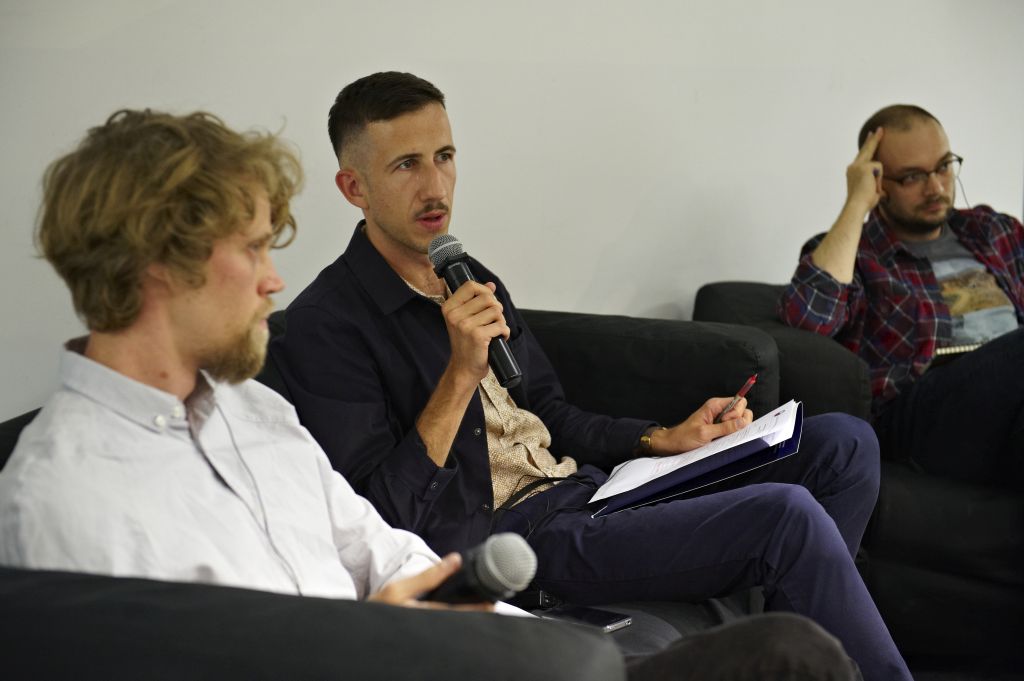The architecture of propaganda. Between Warsaw and Moscow
The guests were Igor Ponosow, Filip Springer and Grzegorz Piątek and the topics discussed during the debate concerned i.a.: what is the nature of the relationship between the man, society and architecture; how the spatial form determines our behavior and influences the actions we take; the function of architecture as a means of political propaganda, as well as the ideological foundations of socialist construction.
INFORMATION ABOUT THE GUESTS
Igor Ponosov – Russian artist, founder and editor-in-chief of an online project Partizaning, author of many publications and projects on street art in Russia and the post-Soviet space, as well as urban activism and culture. The activity of the Partizaning collective is based on the opposition towards the architecture’s antisocial character. Members of the movement use art as a tool to change the everyday architectural reality in Russia and to fight for new forms of state representation. They try to improve the urban space through their events and incline people to reflect on its restructuring. From 2013, Ponosov has been the curator of Delay Sam festival [Do it yourself], which is focused on bottom-up initiatives in Russia.
Filip Springer – reporter and photographer, publishes in the national press, regularly cooperates with the weekly Polityka. His book Miedzianka. Historia znikania [Miedzianka. The story of disappearing] was nominated for the Nike Literary Awards, the Gdynia Literary Awards and the Ryszard Kapuściński Award for Literary Reportage. Other nominations for the book were: the Award for the Historical Book of the Year, the Angelus Central European Literature Award and the Award of the Polish Chamber of Press Publishers. In 2012, Springer published a second book Źle urodzone. Reportaże o architekturze PRL [Badly born. Reportages on PRL architecture] Springer has also published the following books Zaczyn. O Zofii i Oskarze Hansenach (about two visionary architects), Wanna z kolumnadą. Reportaże o polskiej przestrzeni [Bathtub with a colonnade. Reportages about Polish space], 13 pięter [13 floors], Księga zachwytów [A book of delight], and Miasto Archipelag [City Archipelago], and published in 2016 Polska mniejszych miast [Small city Poland]. Springer collaborated with The Leon Schiller National Higher School of Film, Television and Theatre in Łódź, Amnesty International Poland, Greenpeace Poland, Museum of Modern Art in Warsaw and the Office of the European Capital of Culture Katowice 2016 and is currently cooperating with the Reportage Institute in Warsaw. He held scholarships of Marshal of the Wielkopolska Voivodeship (2010), the Minister of Culture and National Heritage (2010) and the National Centre for Culture (2012).
Grzegorz Piątek – architectural critic and curator of the following exhibitions: the Polish Pavilion at the 11th Architecture Biennale in Venice Hotel Polonia. The Afterlife of Buildings, awarded the Golden Lion for the best national exhibition (with Jarosław Trybus, 2008), Open: Poland. Architecture and Identity at the Royal Institute of British Architects, London (with Rob Wilson, 2009), Modernization at the PhotoEspana Festival (with Jarosław Trybuś, 2010). Piątek published articles in books and catalogs, including: Notes from Warsaw (Warsaw, 2007), Wallpaper City Guide. Warsaw (London 2008), Architektura Polska/Polen Architektur (Polish Architecture, Vienna, 2008). He is an author (with J. Trybus) of a guide Warschau. Ein thematisches Fuhrer durch Polens Hauptstadt (Stuttgart 2009) and a map Use It. Warsaw. In the years 2005-2011 he was an editor in the Architektura-murator monthly. Author of series of lectures on architecture at the Museum of Modern Art in Warsaw. Winner of the Annual Award of the Minister of Culture and National Heritage for 2008 and the diploma of the Minister of Foreign Affairs for promotion of Poland in the world (2009). He is an author of the Warsaw’s application in the competition for the title of the European Capital of Culture 2016 (2011).
